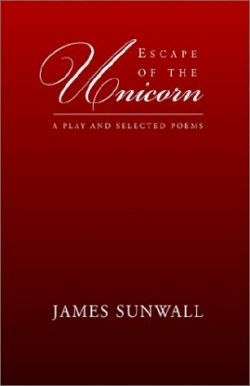Escape of the Unicorn
A combat medic in the Pacific during World War II, James Sunwall survived the same war that spawned the careers of writers like Norman Mailer, Kurt Vonnegut and Joseph Heller—celebrated authors who explored many mediums, including the novel, short story, poetry, stage-play, screenplay, and the essay. With thirty years of experience writing and teaching, Sunwall has also produced an impressive and eclectic body of work.
Escape of the Unicorn contains a play of the same title as well as a selection of poetry titled, “Playing with Matches.” The play takes place during the thirteenth century in the Unicorn Room, the prison of troubadour Robert de Chanson. Robert pens his poetical masterpiece, “The Romance of the Unicorn,” while awaiting his execution. He is interrupted by a priest who seems to want to give Robert absolution. During their first exchange the reader discovers that Robert had once been a part of the priesthood, where he gained the rare ability to read and write. The priest character is an intellectual foil to whom Robert voices his opinions on a variety of topics, including the futility and greed of the Crusades, the afterlife, and even the so-called sanctity of women. With a rapid fire dialogue, Escape of the Unicorn creates a scary parallel between the Crusades and the modern profiteering policies of America in Iraq. The priest explains to Robert that the current crusade was blessed by the Pope as a sacred duty. Robert replies, “A sacred Duty! Do you think that people take the cross and go on Crusades these days for holy motive…We know why others went: the Great Barons mostly for political and economic ambitions, the common men for adventure, some running from obligations and some even as criminals escaping justice.”
Robert’s interactions with the characters in the play are Freudian; each sees a different aspect of Robert and his masterpiece as a fragmented mirror of himself. Readers can easily see the disturbing resemblances to our current time in Robert’s Aquinas-like questions of religious exploitation and the definition and value of art in society.
The second half of the book, “Playing With Matches,” is a collection of poems written and published throughout different periods of Sunwall’s life and career divided into three sections, “Sad Memories of A Happy Childhood,” “Jesting Pilate,” and “Writers/Artists.” At first glance the poems seem to go everywhere at once. Further examination reveals that they were specifically chosen and placed in such careful accordance that the poems and the play complement and enhance each other. His way with words, their musicality and imagery are a long and beautiful trip, as illustrated by the following lines from his poem, “The Advisor Waits”: “Once I sat opposite / just such a desk: / ready to ride the hippogriff / to knowledge and renown.”
James Sunwall is a professor emeritus at the University of Florida, and has written several literary works, including the novel, The Keys to Nine-West: Marching as to War. Readers who want substance in their literature will celebrate Sunwall’s introspection. Escape of the Unicorn is a gentle and loving eulogy for the twentieth century and a wake-up call for the twenty-first.
Disclosure: This article is not an endorsement, but a review. The publisher of this book provided free copies of the book and paid a small fee to have their book reviewed by a professional reviewer. Foreword Reviews and Clarion Reviews make no guarantee that the publisher will receive a positive review. Foreword Magazine, Inc. is disclosing this in accordance with the Federal Trade Commission’s 16 CFR, Part 255.

